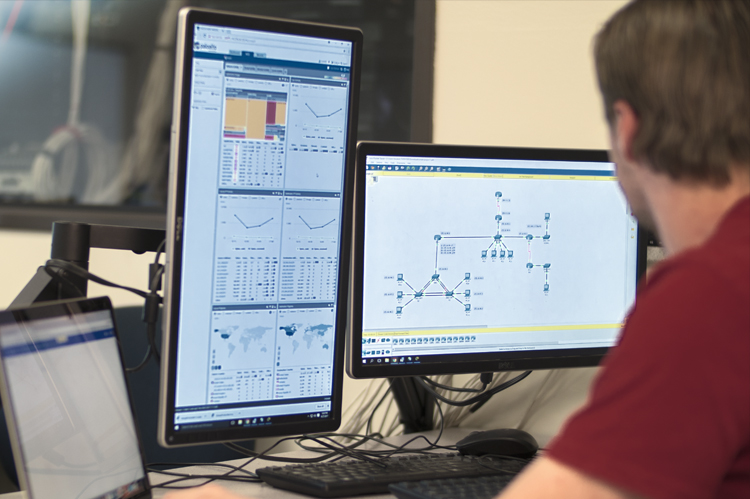Cybersecurity AS Degree

NETECH-111 COMPUTER MAINTENANCE: A+ Cert.
3 units | CSU 36 Lecture hours, 54 Lab Hours
Provides instruction in computer repair and upgrade including content related to the Computing Technology Industry Association (CompTIA) A+ certification. Formerly CMPNET-132.
NETECH-150 NETWORK FUNDAMENTALS (NETWORK+)
3 units | CSU 36 Lecture hours, 54 Lab Hours
NETECH-150 exposes students from an entry-level knowledge of computer networks to advanced concepts in Ethernet and TCP/IP networks. Routing protocols, configurations, local, campus, and wide area network configurations are covered throughout this course. Additionally, we explore network security, wireless networking, optical networks, Voice over IP (VOIP), servers, and Linux networking from a practical hands-on approach.
NETECH-151 CCNA: INTRO TO NETWORKS
3 units | CSU 36 Lecture hours, 54 Lab Hours
First of three classes in designing, configuring, and maintaining LANs, including cabling, IP addressing, network technologies, and network troubleshooting skills. This course aligns with the Cisco CCNA certification exam. Formerly CMPNET-154.
NETECH-155 CCNA CYBERSECURITY OPERATIONS
3 units | CSU 36 Lecture hours, 54 Lab Hours
Prerequisite: NETECH-151
Introduces Cybersecurity focusing on investigating endpoint vulnerabilities and attacks and evaluating network security alerts. This course aligns with the Cisco
CCNA CyberOps certification exam.
NETECH-211 LINUX+ CERTIFICATION PREP
3 units | CSU 36 Lecture hours, 54 Lab Hours
Provides the foundation for the development of Linux/UNIX administration skills. This course aligns with the CompTIA Linux+ certification. Formerly CMPNET-191.
NETECH-219 SECURITY+ CERTIFICATION
3 units | CSU 36 Lecture hours, 54 Lab Hours
Prerequisite: NETECH-113
Covers basic concepts in network security including security baselines, securing the network infrastructure, web security, cryptography, operational security, security
policies, and introduces computer forensics. This course aligns with the CompTIA Security+ certification exam. Formerly CMPNET-171.
NETECH-259 CCNA SECURITY
3 units | CSU 36 Lecture hours, 54 Lab Hours
Prerequisite: NETECH-153
Introduces WAN Network Security focusing on installation, troubleshooting and monitoring of network devices to maintain integrity, confidentiality and availability of data and devices. This course aligns with the Cisco CCNA Security certification exam. Formerly CMPNET-271.
CYBER-111 DEVELOPING CYBERSECURITY PROGRAMS AND POLICIES
3 units | CSU 36 Lecture hours, 54 Lab Hours
This course prepares students to thoroughly understand and navigate modern information security regulations as well as develop comprehensive Cybersecurity programs and policies. This course has students evaluate best-practice policy for key-industry sectors; learn how to establish program objectives, elements, domains, and governance, while navigating standards, and implementing procedures, guidelines and plans. Additionally, this course covers implementing effective physical, environmental, communications, and operational security, while contending with concepts such as incident response and continuity of operations.
CYBR-241 ETHICAL HACKING AND PENETRATION TESTING
3 units | CSU 36 Lecture hours, 54 Lab Hours
This course brings the essential concepts of pen testing into a rigorous and comprehensive course that covers the entire penetration testing lifecycle. CYBR-241 integrates theory, scenarios, and challenges that walk students through every step, from planning a penetration test to effective post-test reporting.
This course is experiential focused with sample projects from start to finish, teaching effective use of open-source tools, scripting, and attack configurations. This course covers pen testing standards from NSA, PCI, and NIST frameworks.
CYBR-251 NETWORK DEFENSE AND COUNTERMEASURES
3 units | CSU 36 Lecture hours, 54 Lab Hours
This course covers essential network security concepts and best-industry practices for shoring up vulnerabilities. Learn the mechanisms of modern attacks and how to coordinate firewalls, intrusion detection systems (IDS), and virtual private networks (VPNs) to thwart them. Through sample use-cases, learn to select the right security technologies for any network environment; protect and encrypt information; harden Windows and Linux systems and securely configure services to be more attack resistant. Hands-on scenarios have you defending against malware; define practical, enforceable security policies, and learn to assess technical and human aspects of system security.
CYBR-260 CYBERSECURITY OPERATIONS (INCIDENT RESPONSE AND DIGITAL FORENSICS)
3 units | CSU 36 Lecture hours, 54 Lab Hours
This course presents best practices for capturing and analyzing evidence, protecting the chain of custody, and documenting investigations; while adhering to law, policy, or statute- so evidence can be considered valid. Explore technologies and technical challenges, of concepts such as mobile forensics, Mac forensics, cyberbullying, and child endangerment. Another practical, hands-on, activity-based course has students work through case studies for pragmatic mastery of modern digital forensics tools and techniques.

 My Canyons
My Canyons  Canvas
Canvas 
